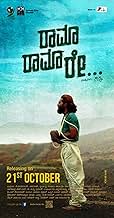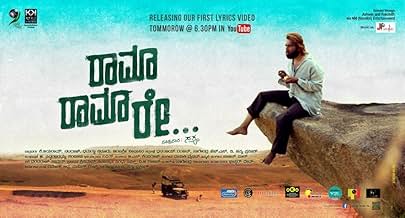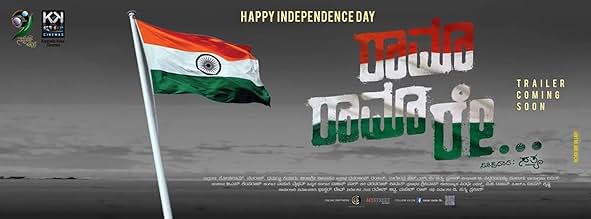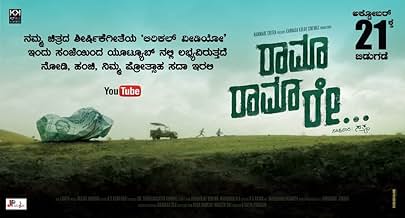A renowned criminal plans his prison break and tries to run away from his death row as far as he could.A renowned criminal plans his prison break and tries to run away from his death row as far as he could.A renowned criminal plans his prison break and tries to run away from his death row as far as he could.
- Awards
- 2 wins & 3 nominations
- Director
- Writers
- All cast & crew
- Production, box office & more at IMDbPro
Storyline
Did you know
- ConnectionsRemade as Aatagadharaa Siva (2018)
Featured review
In the age of cookie cutter films which infect the mainstream, this is an incredibly refreshing take. It's extremely rare to see a film such as this even in the oft celebrated realm of Hollywood, too. D. Satya Prakash's debut is nothing short of a masterpiece. It demands the viewer's attention from the get-go, yet it's not full of itself (a flaw a lot of "philosophical" films have). It even falls into the genre of a tragicomedy at times.
It follows the story of 4 titular characters. Sandal Raja, an escaped convict, Ramanna, an old man and Subbi and Dharma, an eloping couple. They cross paths in a desert and along the way, meet a soldier, who is returning to his pregnant wife who is in the 9th term. Their personalities are very present and the performances do their roles justice as none of the characters feel overdone or underdeveloped. They have a lot of soul. The characters are relatively simple when looked at on the surface, but have a tremendous amount of depth to them and are very complex. The film is not a sentimental affair either, as the humor, while it does not significantly contribute to the story, is still wholesome and provides a break from some of the rather intense scenes. The film does not take itself seriously and this works tremendously to it's advantage.
The soundtrack is also simple, but it enriches the story with folk-y instrumentation and songs. There are no filler songs and every song is pretty great. The main theme is extremely emotive. One of the most stellar moments in the film happens to be in a song, as a crew of travelers/gypsies dressed as Krishna, Arjuna and their subsidiaries get into Ramanna's truck and sing a part of the Gita with their own twist.
The nihilism is very palpable, but it cuts much, much deeper than that. It has a lot on it's mind and the way it's explored is simple, but incredibly eloquent. In fact, the beauty is in it's sheer simplicity. But don't let this fool you, the simplicity does not indicate a lack of depth. It alludes to the Gita and The Mahabharata all throughout but is not the least bit preachy. Themes of isolation, redemption, happiness are rife throughout the film. This however, does not alienate anyone as this is not done pretentiously at all. It feels human and genuine and is again, full of soul.
The cinematography is simple too, but is nothing short of excellent. The heat of the desert, the thirst and loneliness that comes along with it can be felt through the screen. It gets symbolic at times and the symbols accentuate the core point of the film (and I'm a sucker for symbols). These are done in an extremely humble and profound manner as well.
It is a celebration of life, a quest for redemption and happiness in this weird, unforgiving, beautiful world. Most importantly, it's about being human.
It follows the story of 4 titular characters. Sandal Raja, an escaped convict, Ramanna, an old man and Subbi and Dharma, an eloping couple. They cross paths in a desert and along the way, meet a soldier, who is returning to his pregnant wife who is in the 9th term. Their personalities are very present and the performances do their roles justice as none of the characters feel overdone or underdeveloped. They have a lot of soul. The characters are relatively simple when looked at on the surface, but have a tremendous amount of depth to them and are very complex. The film is not a sentimental affair either, as the humor, while it does not significantly contribute to the story, is still wholesome and provides a break from some of the rather intense scenes. The film does not take itself seriously and this works tremendously to it's advantage.
The soundtrack is also simple, but it enriches the story with folk-y instrumentation and songs. There are no filler songs and every song is pretty great. The main theme is extremely emotive. One of the most stellar moments in the film happens to be in a song, as a crew of travelers/gypsies dressed as Krishna, Arjuna and their subsidiaries get into Ramanna's truck and sing a part of the Gita with their own twist.
The nihilism is very palpable, but it cuts much, much deeper than that. It has a lot on it's mind and the way it's explored is simple, but incredibly eloquent. In fact, the beauty is in it's sheer simplicity. But don't let this fool you, the simplicity does not indicate a lack of depth. It alludes to the Gita and The Mahabharata all throughout but is not the least bit preachy. Themes of isolation, redemption, happiness are rife throughout the film. This however, does not alienate anyone as this is not done pretentiously at all. It feels human and genuine and is again, full of soul.
The cinematography is simple too, but is nothing short of excellent. The heat of the desert, the thirst and loneliness that comes along with it can be felt through the screen. It gets symbolic at times and the symbols accentuate the core point of the film (and I'm a sucker for symbols). These are done in an extremely humble and profound manner as well.
It is a celebration of life, a quest for redemption and happiness in this weird, unforgiving, beautiful world. Most importantly, it's about being human.
- Cartoons_And_Serial
- Apr 5, 2020
- Permalink
Details
Box office
- Budget
- ₹10,000,000 (estimated)
- Runtime1 hour 52 minutes
- Color
- Aspect ratio
- 2.35 : 1
- 2.39 : 1
Contribute to this page
Suggest an edit or add missing content





















